Annual Report – 2021
ANNUAL REPORT OVERVIEW
Who are we?
The British Columbia Used Oil Management Association (BCUOMA) is a not-for-profit society that operates a province-wide collection and recycling program dedicated to collecting and recycling lubricating oil, oil filters, oil containers, antifreeze and antifreeze containers from both the do-it-yourself market as well as the commercial and industrial markets.
Our goal is to provide British Columbians with an eco-friendly and cost-effective way to dispose of our program materials and keep everyone safe. Each year, approximately 50 million litres of oil and 3 million litres of antifreeze are collected and responsibly managed through our program.
What do we do?
Formed under the British Columbia Society Act in 2003, BCUOMA has worked hard to continually improve collection and recycling performance in all regions of the province and across all product categories.
BCUOMA is managed by a multi-stakeholder Board of Directors with representatives from various sectors, including manufacturing, retail, local government and the public at large. BCUOMA provides incentives to recyclers to ensure that oil, filters, antifreeze, and containers throughout BC are collected and managed. The collectors pick up the materials from generators and publicly accessible recycling centres across the province and deliver the materials to the BCUOMA registered processors, where they are processed to the point that they can be reused or sold as raw material inputs for manufacturing or energy products.
Why do we need BCUOMA?
Year over year, we are becoming increasingly aware that simply throwing away or dumping oil products, not only harms the environment, but also wastes a valuable non-renewable resource. Through the BCUOMA program,
British Columbians can now:
- Recover more used oil, antifreeze, filters and containers
- Extend the life of a non-renewable natural resource
- Provide the recycling industry with oil, antifreeze, plastic and steel
- Decrease pollution caused by improper disposal
- Reduce the amount of recyclable materials in our landfills
- Contribute to the growth of a circular economy in BC.
What happens to the products collected?
BCUOMA’s mandate is to ensure the responsible collection and management of the used oil, antifreeze, filters and containers required under the BC Recycling Regulation as well as provide British Columbians with an eco-friendly and cost-effective way to dispose of these materials.
Used oil collected through the program is re-refined into new lubricating oil or processed for material inputs for manufacturing or energy products. Like oil, antifreeze is also a product that is highly recyclable, with all of the used antifreeze being recycled into new automotive antifreeze. Oil filters are crushed and taken to a steel mill to manufacture new steel products, while plastic oil and antifreeze containers are recycled into new oil containers, drainage tiles, and parking curbs.
LETTER FROM THE CHAIR
On behalf of the BC Used Oil Management Association, I am pleased to present the 2021 Annual Report.
In 2021, we began to imagine what our industry, and the world for that matter, would look like post pandemic. We knew it would take time for us to get back to normal, and that normal may look very different than it had before, but we also knew our goal of ensuring oil and antifreeze products are responsibly managed in British Columbia hadn’t changed.
As the world began to open up and supply chain issues started to ease, we were able to get back to providing support to communities around the province. In total, we awarded 26 infrastructure grants to help collection facilities do the important work of collecting and managing program materials from the public.
We worked together with our network of collectors to ensure they were able to service all communities in an efficient and cost-effective way. And we’re proud of the fact that many of the products collected in BC were also processed right here in the province, feeding into the circular economy system.
Early in the year, we announced the winners of our second annual Top Collector Awards, which honour the facilities with the highest collection rates who have shown a dedication and commitment to the program. These RCFs are a key part of our program, and we are grateful for the hard work they do on behalf of BCUOMA.
Working in collaboration with our used oil management association partners across the country, we continued to make new improvements to the Canada-wide electronic reporting system used for the handling of environmental handling charges. The EHC OneWindow program has been instrumental in streamlining interactions with our members and allowing our business to operate more efficiently.
In November, the Board and Staff came together for a Strategic Planning Session that focused on the future of BCUOMA and helped set a roadmap for where we want to be in the coming years. Our achievements are only possible because of the support from our members and other important stakeholders, and we know that with such a dedicated group of partners behind us, there is so much more we can accomplish.
I would like to thank everyone involved in the BCUOMA program for helping make 2021 another successful year. I look forward to the year ahead.
Brian Ahearn

Board Chair
BCUOMA
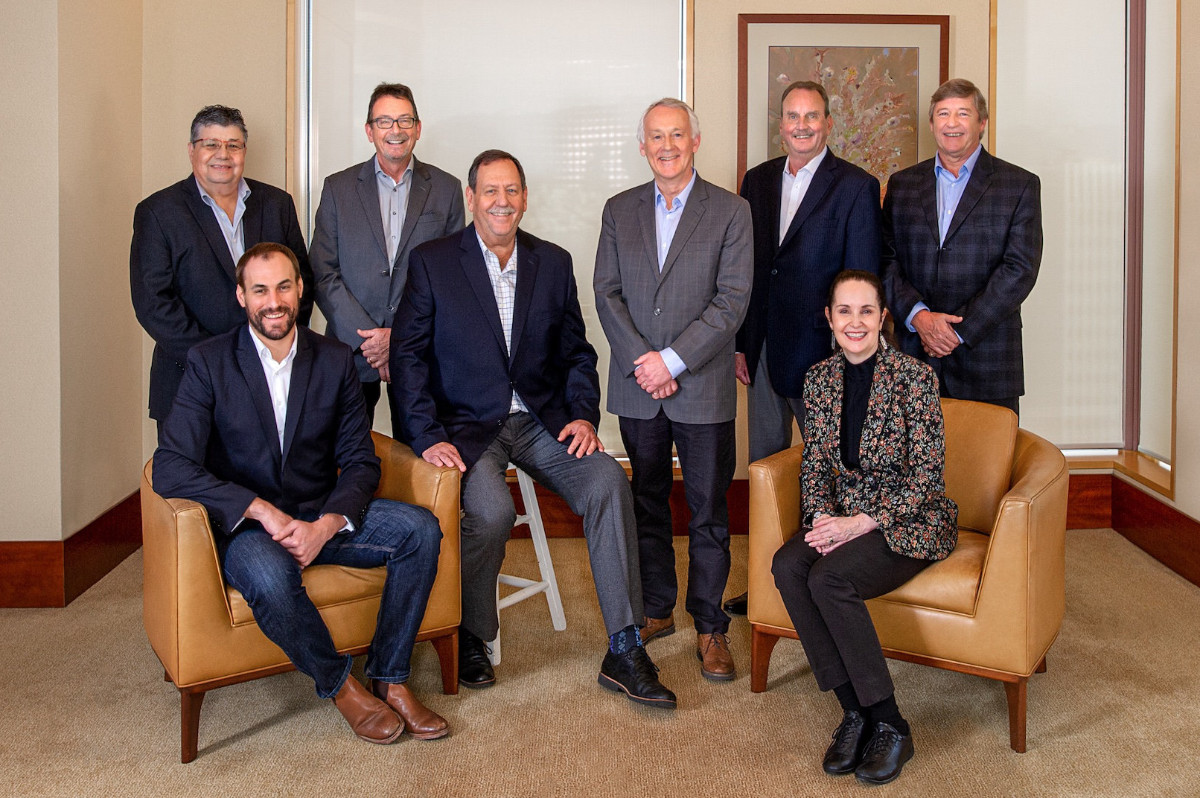
| 2021 BCUOMA BOARD OF DIRECTORS |
|---|
| Brian Ahearn, Chair Canadian Fuels Association |
| Lonnie Cole, Secretary Filter Industry |
| Natalie Zigarlick, Treasurer Public Member |
| Don Hetherington Mr. Lube Canada |
| Dan Higgins Canadian Tire |
| Sam DeGuillio Antifreeze Industry |
| Vincent Gauthier Petro-Canada Lubricants Inc. |
| Gord Klassen City of Fort St. John (Not Pictured) |
| Wayne Marees Chevron Canada Ltd. |
LEADERS IN INNOVATION
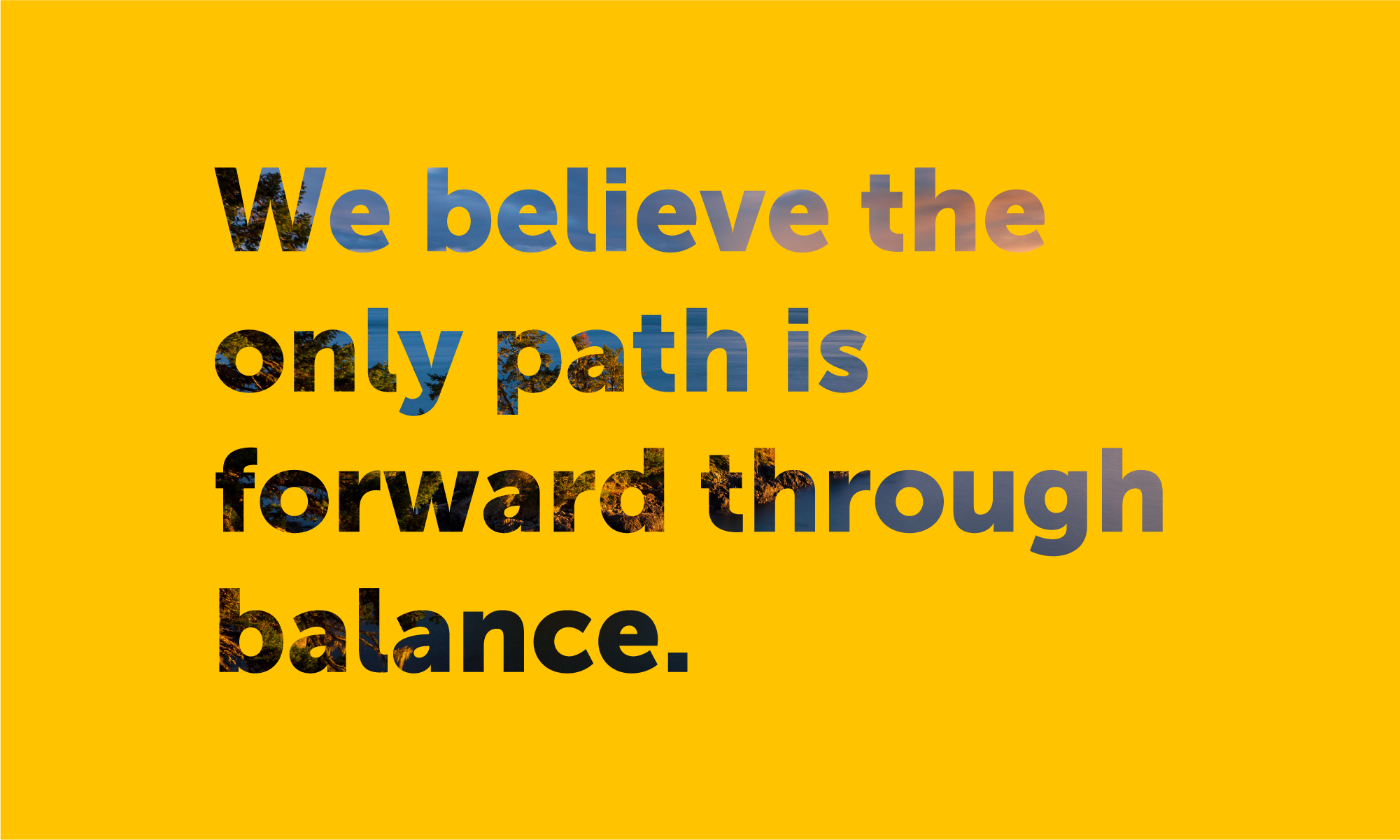
Adaptability is paramount as we work to ensure the needs and expectations of British Columbians and our key stakeholders are not only met but exceeded.
We see ourselves as leaders of innovation in the area of environmental stewardship, and here are just a few of the ways we have raised the bar:
Infrastructure Grants
BCUOMA is committed to supporting the collection and recycling of used motor oil and other program materials from British Columbians through our network of public recycling centres. One of the ways that we ensure program materials are collected and stored in a safe and environmentally friendly manner is by providing facilities with the infrastructure they need through our Infrastructure Grant program.
Grants are available to registered municipalities, private businesses, non-profit organizations, and other sectors that require additional infrastructure for their public collection facilities, such as modified sea containers, tanks, covered sheds or other containment materials for used oil, antifreeze, filters, and containers.
“On behalf of the Regional District I would like to thank BCUOMA for the continued support in providing our communities with the opportunity to safely Recycle Used Oil and Antifreeze products.”
Ron Hamilton
Regional District of Okanagan-Similkameen
“This will help with keeping our site clean and will address the challenges we are facing. Thank you very much for your support.”
Marie-Lou Leblanc
Squamish-Lillooet Regional District
“The seacans are great and really help clean up our lot! Thanks for helping me out with this.”
Mike Bernhardt
Great Canadian Oil Change
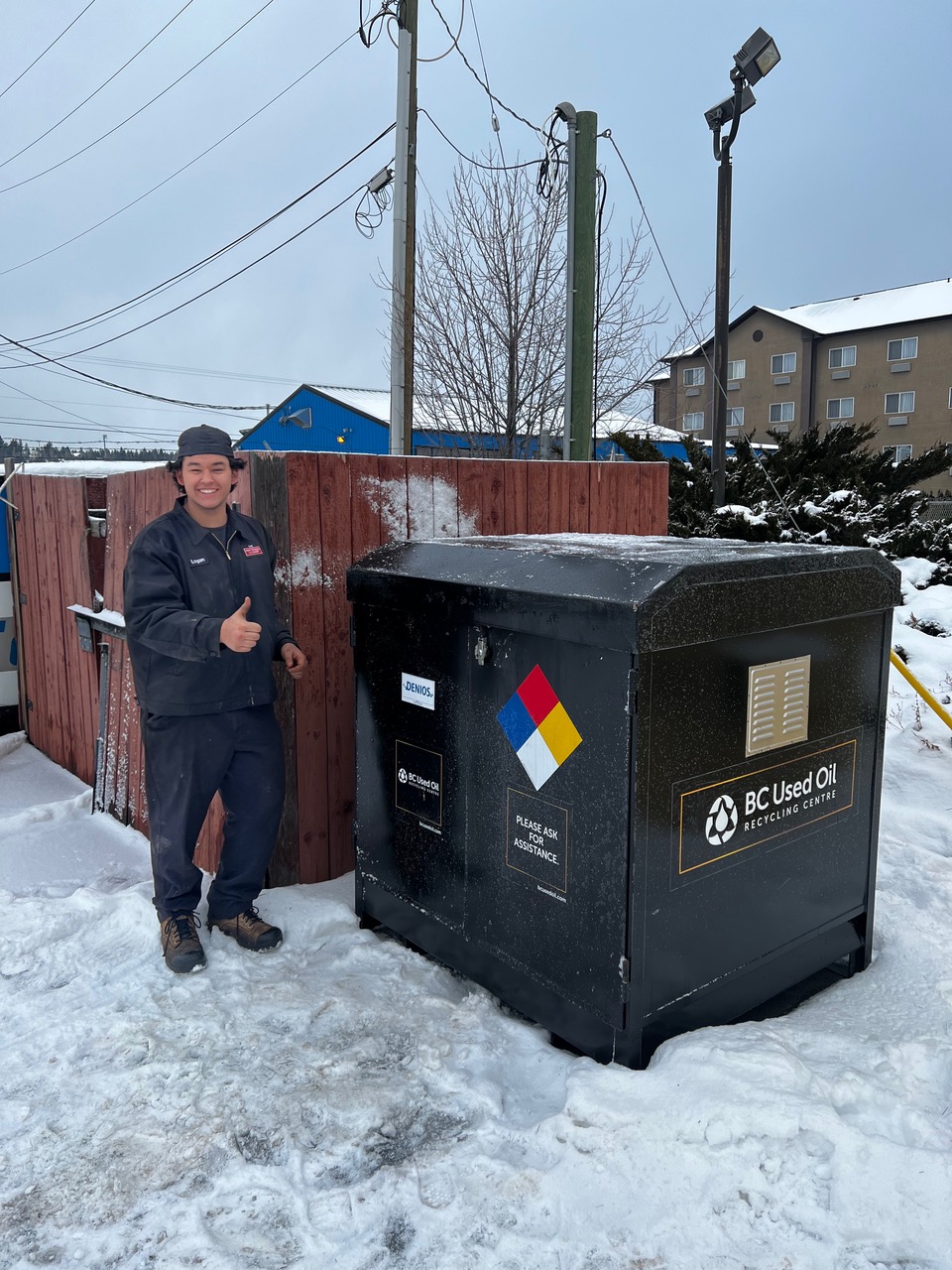
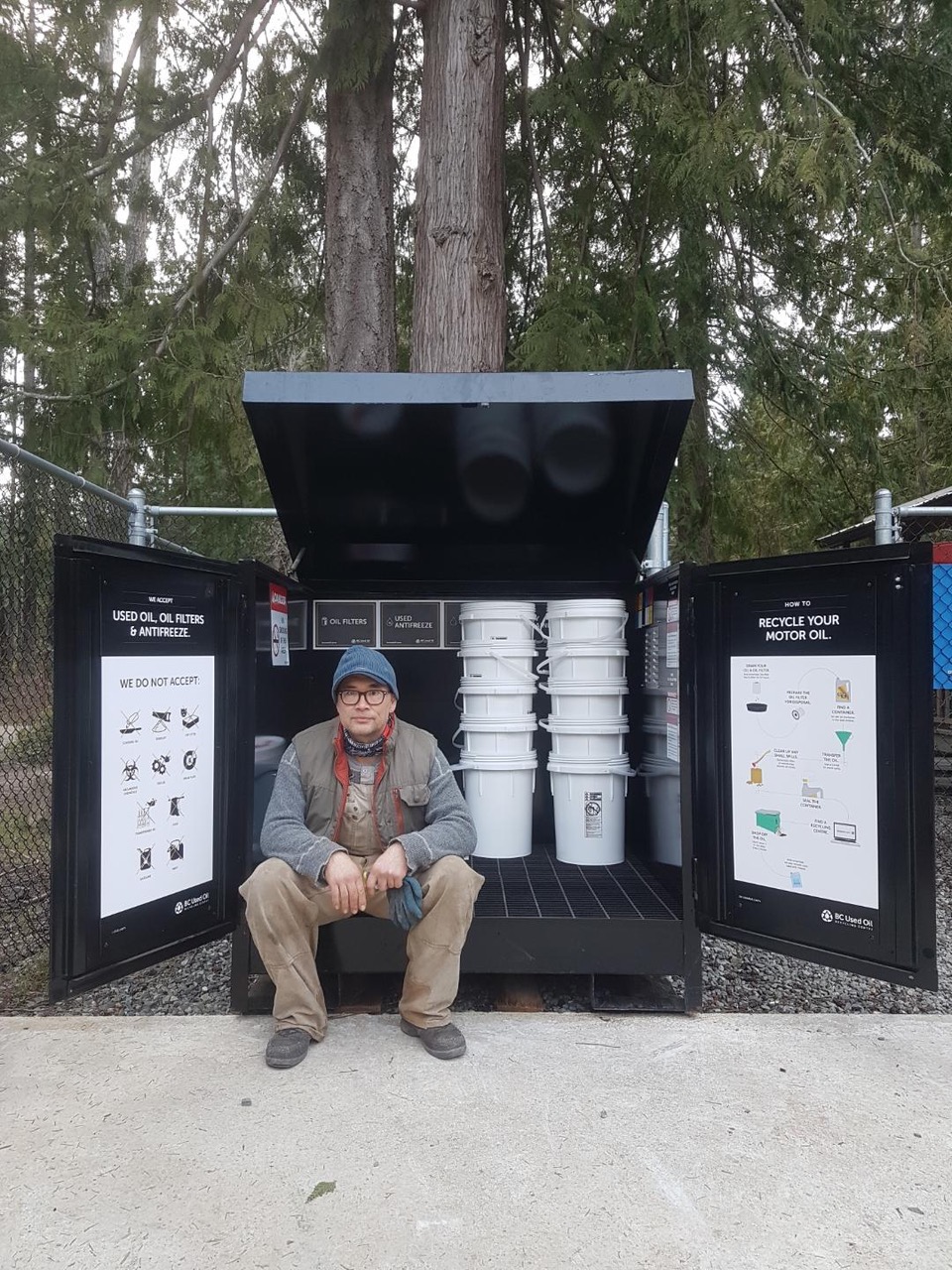
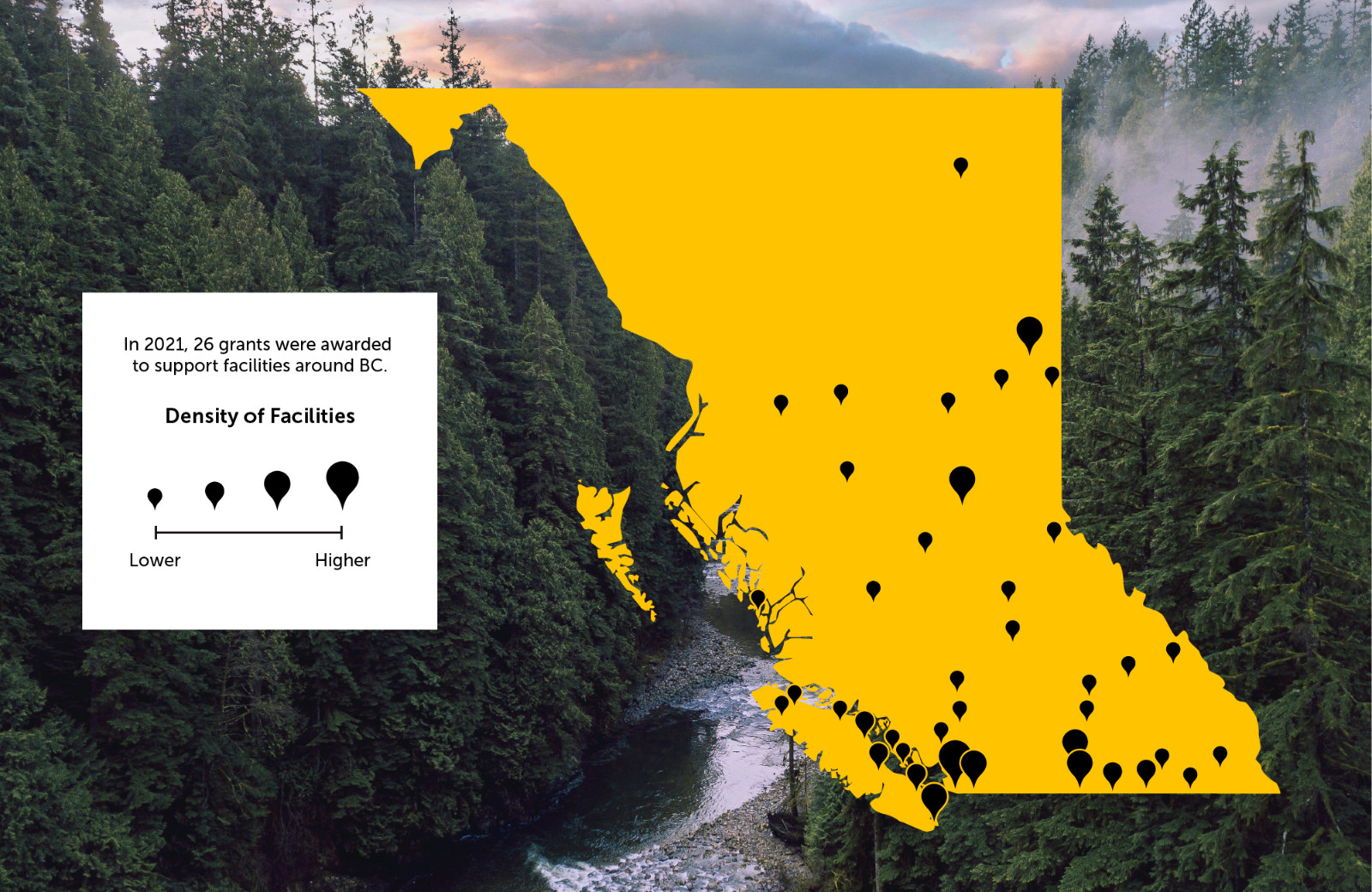
Mobile Pick-up Program
Over the past few years, we have had a few situations where, for a variety of reasons, it took us longer than expected to provide a community with a brick- and-mortar public recycling facility for our program and we had to find new and innovative ways to help residents. One great example of that is our Mobile Pick-Up Pilot launched in early 2020 to fill a growing need in the Lower Mainland (specifically the North Shore and Vancouver). With just a phone call, residents were able to arrange for their materials to be picked up directly from their home at no cost to them.
While these communities are now serviced by a more permanent return collection facility, this program will continue to be used when needed to fill gaps that may arise in the future.
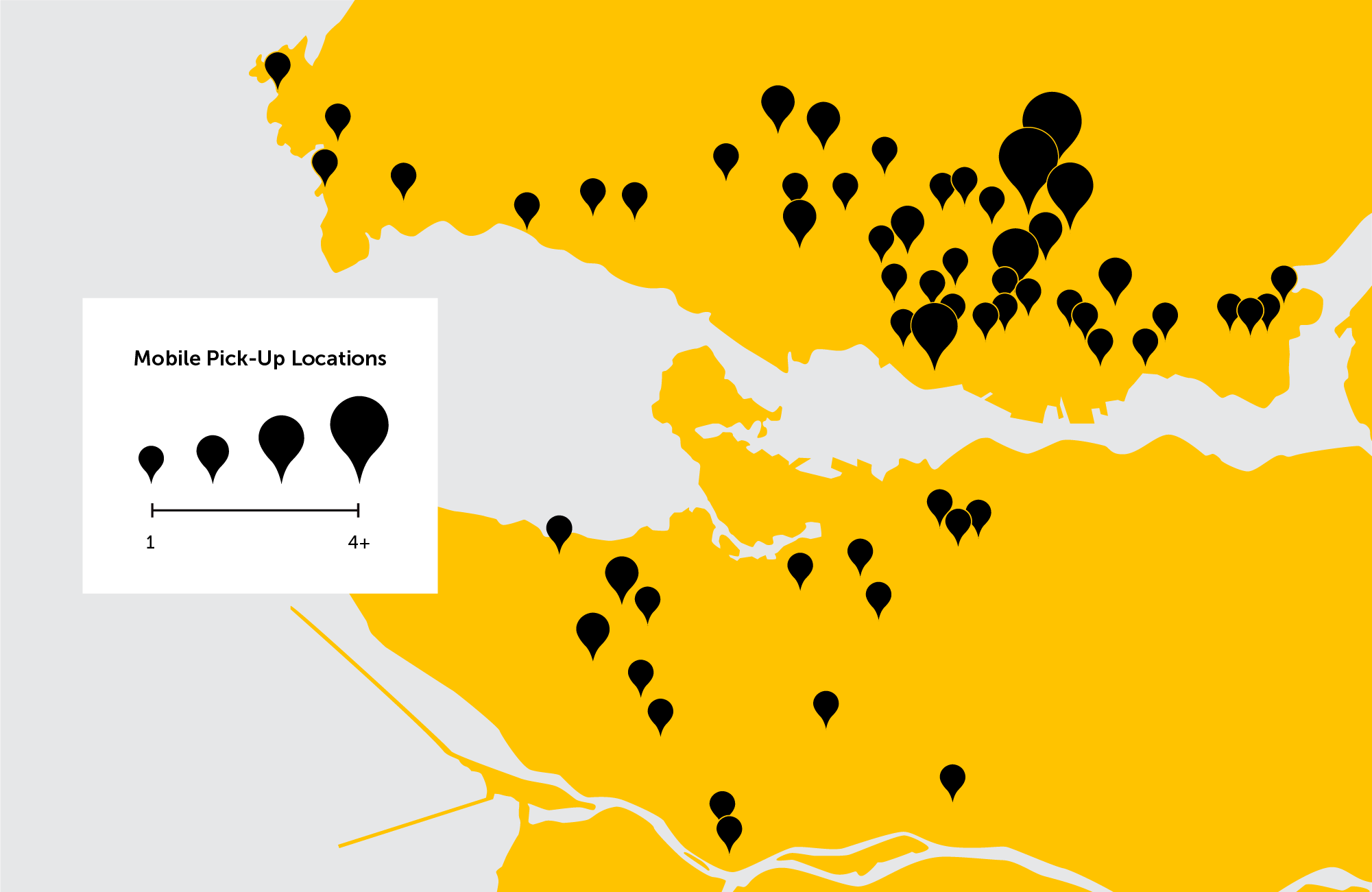
First Nations Collaborations
BCUOMA has worked with multiple First Nation communities to help them implement used oil collection systems. This initiative includes assessing the community needs, supplying equipment and infrastructure through the grant program, training site operators and connecting the facility to the BCUOMA collection network to ensure materials are recycled.
- Tahltan Band
- Takla Nation Eco-Depot
- Kitasoo Band Council
- Heiltsuk Environmental Services
- Hesquiaht First Nation
- Lil’wat Nation
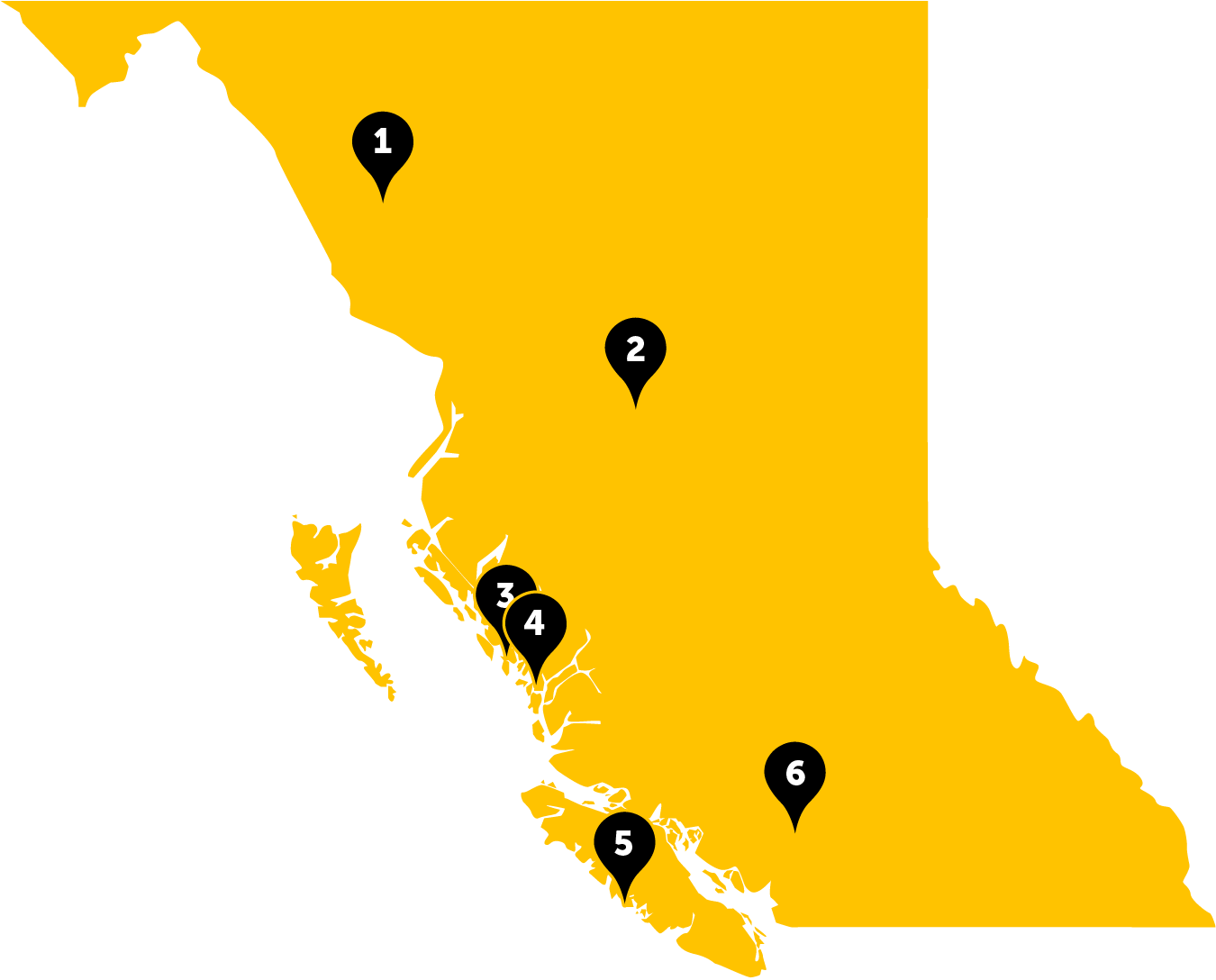
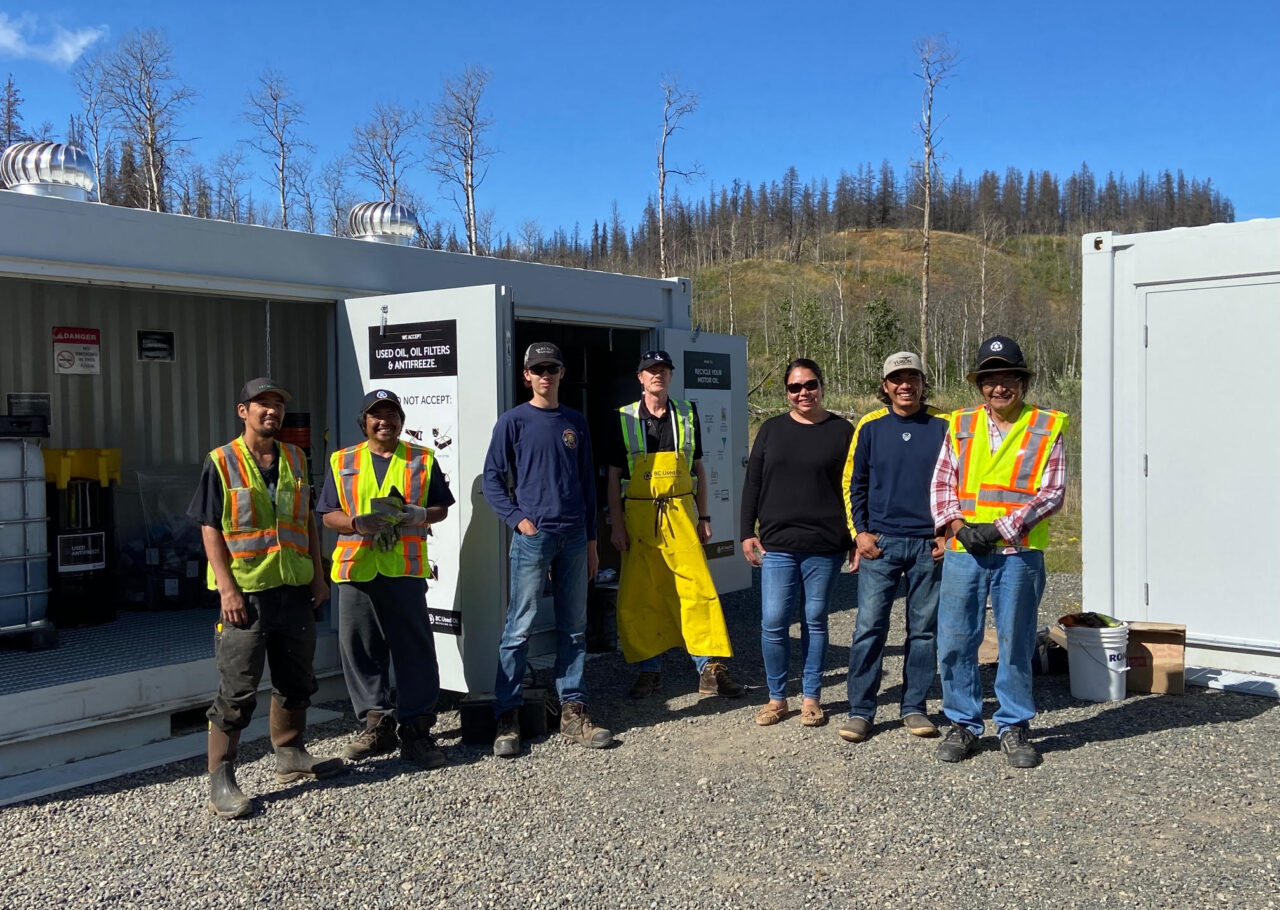
Marine Program
With the significant amount of coastline in British Columbia, it’s important that we ensure the boating community is aware of their responsibility to recycle any used motor oil from marine vessels. We partnered with the Georgia Strait Alliance and their Clean Marine BC program to help spread the word.
BCUOMA was featured as a partner of the program, and we placed an ad in the Guide to Green Boating which was distributed to thousands of boating enthusiasts.
We were also invited to present at a Spill Training event and provided the audience with details on how to recycle their program materials responsibly.
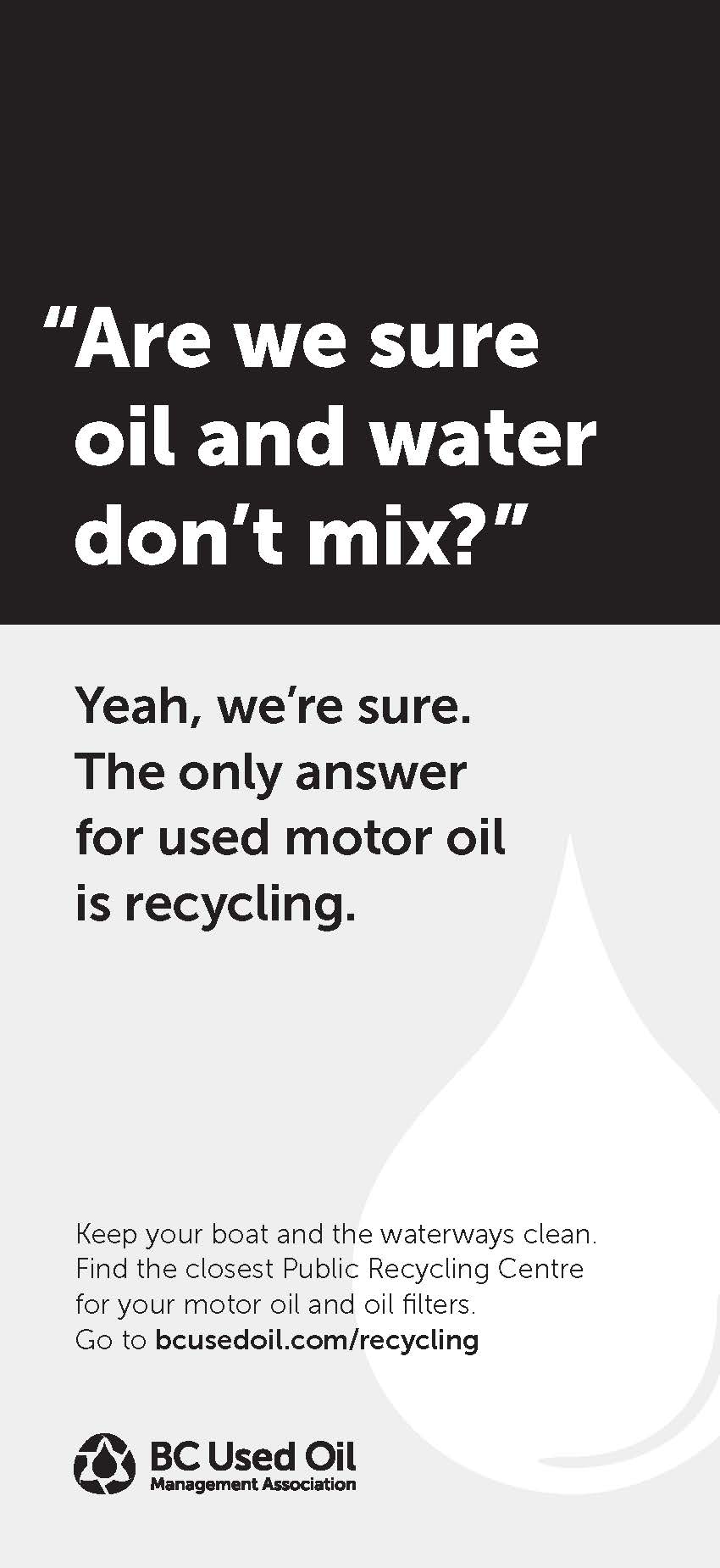
COMMUNICATIONS & PUBLIC OUTREACH
The pandemic continued to have an impact on how we communicated with the public and many of the adjustments we made in 2020 stayed in place including:
- No in-person community engagement events
- Expanded use of digital assets to share message
- Increased public relations outreach to generate press coverage
Despite the pandemic, we were very successful in achieving significant reach with our brand awareness campaign:
Awareness Campaign
- Length: 8 months, April to December
- Channels: Radio, outdoor, digital, social, search
- Estimated Reach: 58 million+
Public Relations
- 55 Press Releases Sent
- 214 print, digital, broadcast and social media mentions
- Estimated Reach: ~13.5 million
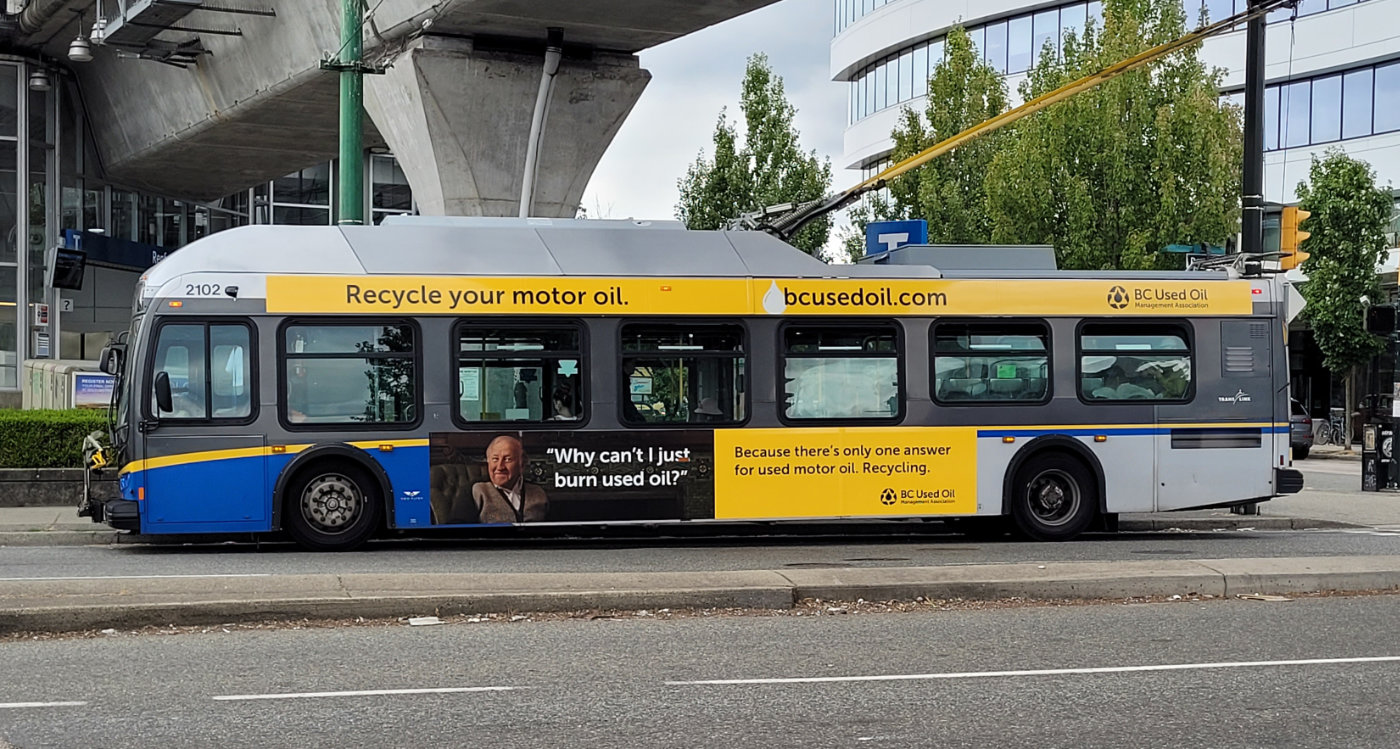
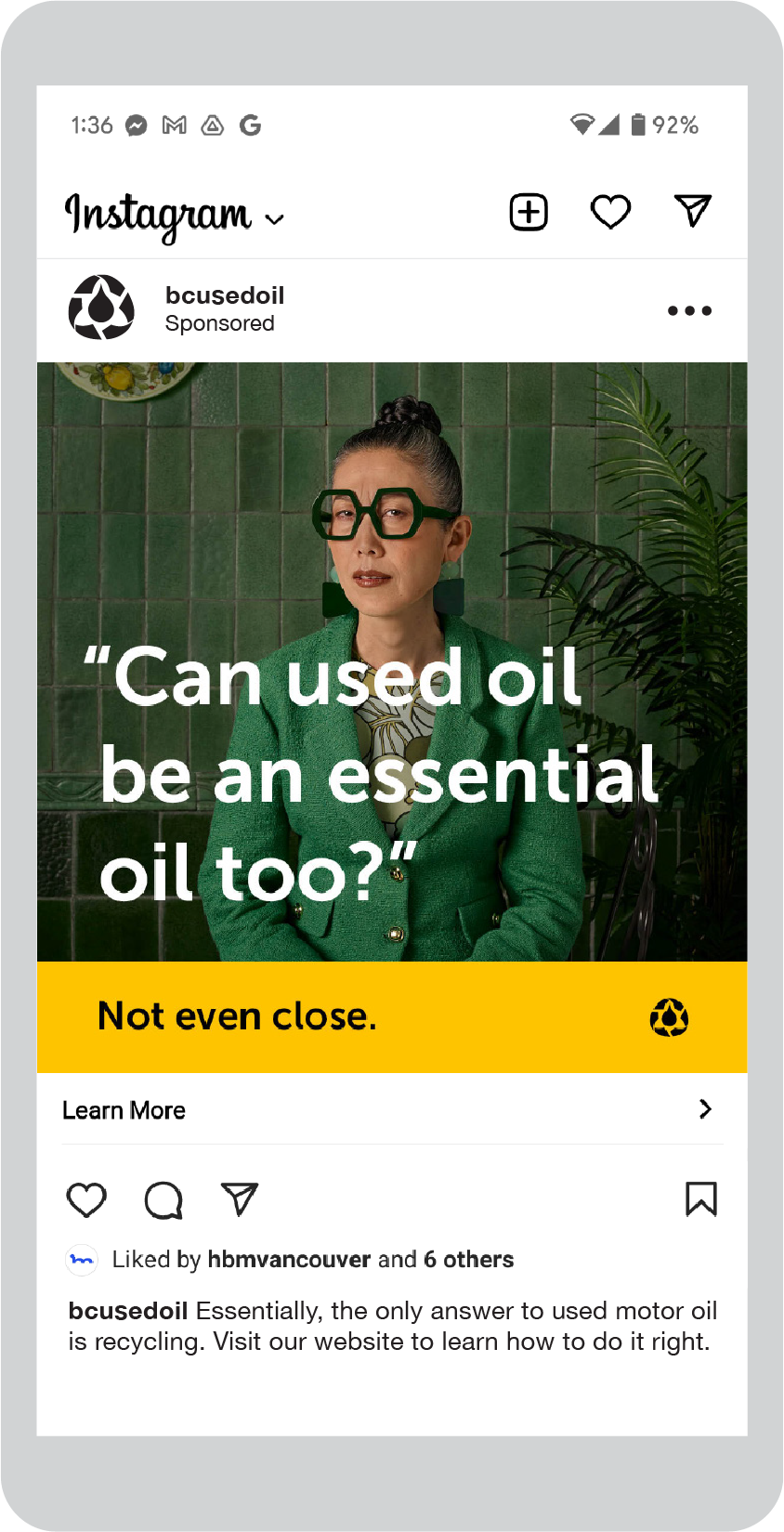
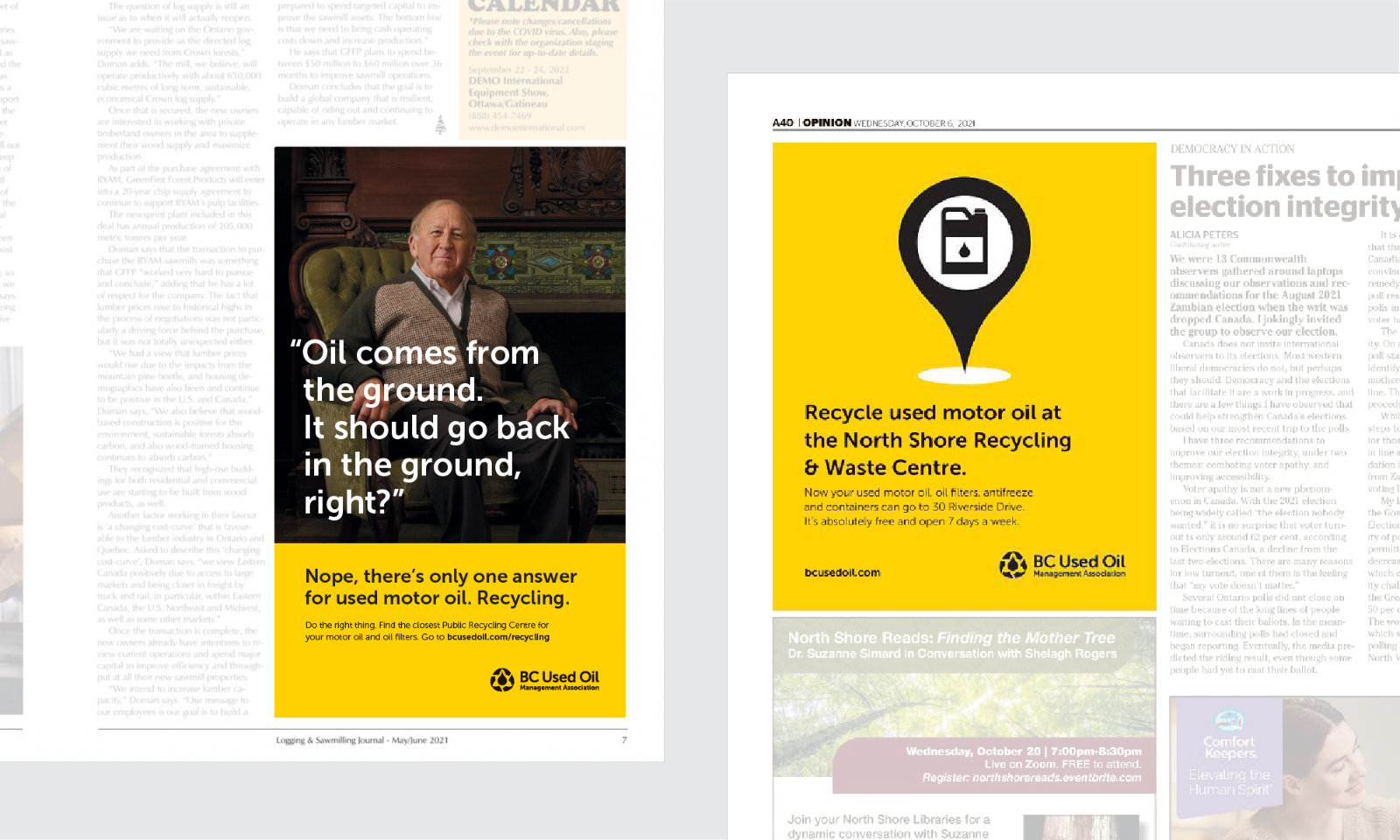
Consumer Awareness
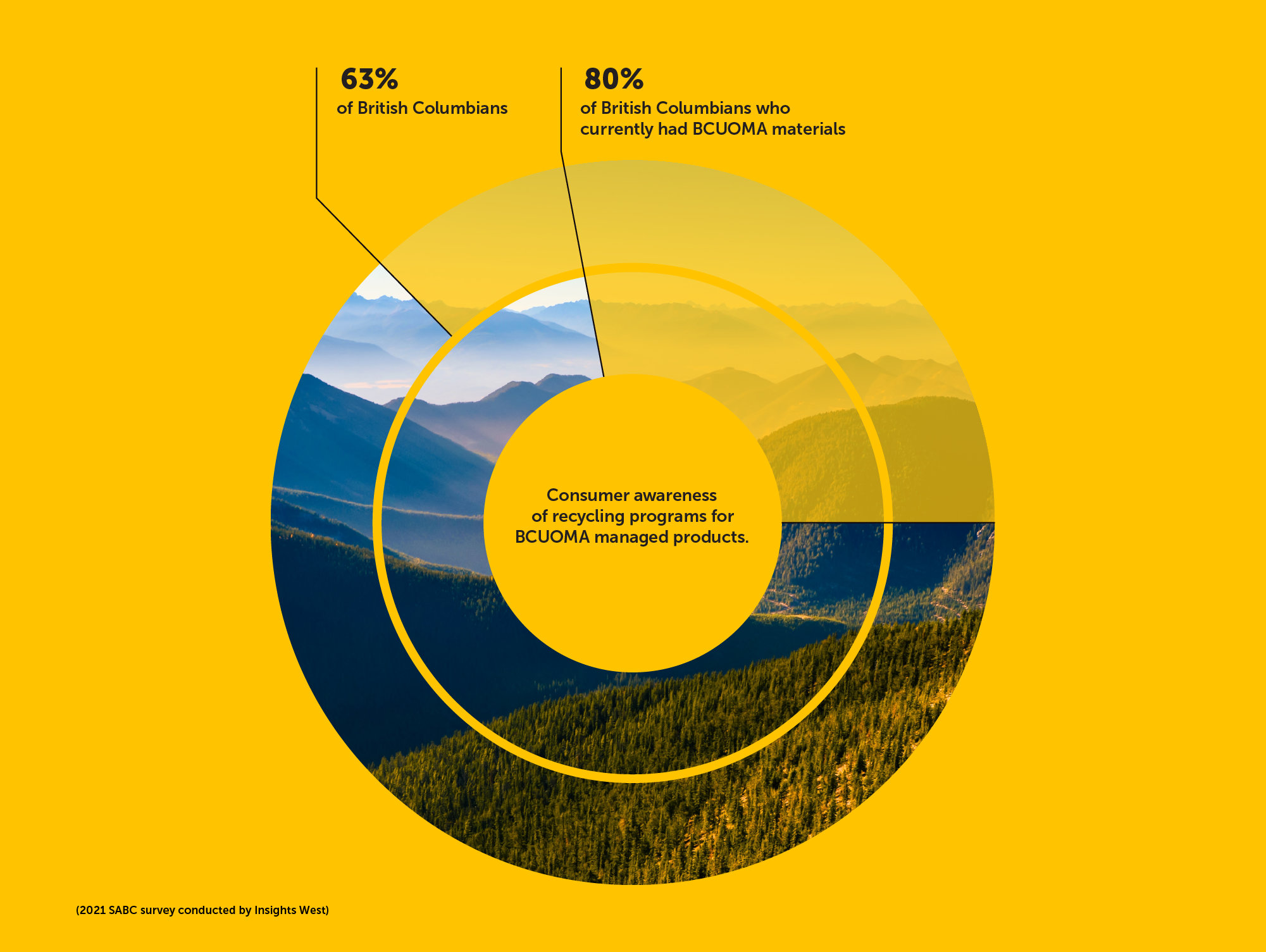
This is the last year we will report one figure relating to consumer awareness as we feel it is more beneficial to break awareness down into more targeted categories. Using a baseline established in 2021, moving forward we will report on three new awareness performance metrics for both general public and DIYers (people that have program materials to return to a public recycling centre):
Program Awareness
Do you know about the BCUOMA program?
- General Public Target: 65%
- DIYers Target: 75%
Location Awareness
Do you know where your closest recycling centre is?
- General Public Target: 50%
- DIYers Target: 65%
Information Source Awareness
Do you know where to search for recycling centre locations?
- General Public Target: 60%
- DIYers Target: 70%
Collection Event Summary
With the easing of restrictions, Regional Districts, municipalities, and other groups were once again able to hold community collection events and BCUOMA was proud to provide grants for eight such events in 2021.
- September 11 – Castlegar (Regional District of Central Kootenay)
- September 18 – Creston (Regional District of Central Kootenay)
- September 19 – Kaslo (Regional District of Central Kootenay)
- September 25 – Silverton (Regional District of Central Kootenay)
- September 26 – Nakusp (Regional District of Central Kootenay)
- October 2 – Summerland (Regional District of Okanagan-Similkameen)
- October 23 – Chilliwack (City of Chilliwack)
- October 23 & 24 – Langley (Township of Langley)
These community collection events are a great way for residents to safely return any materials and hazardous waste they have been storing in their homes and are unsure what to do with. BCUOMA is often one of several stewardship programs participating in the event.
Key Collaborators
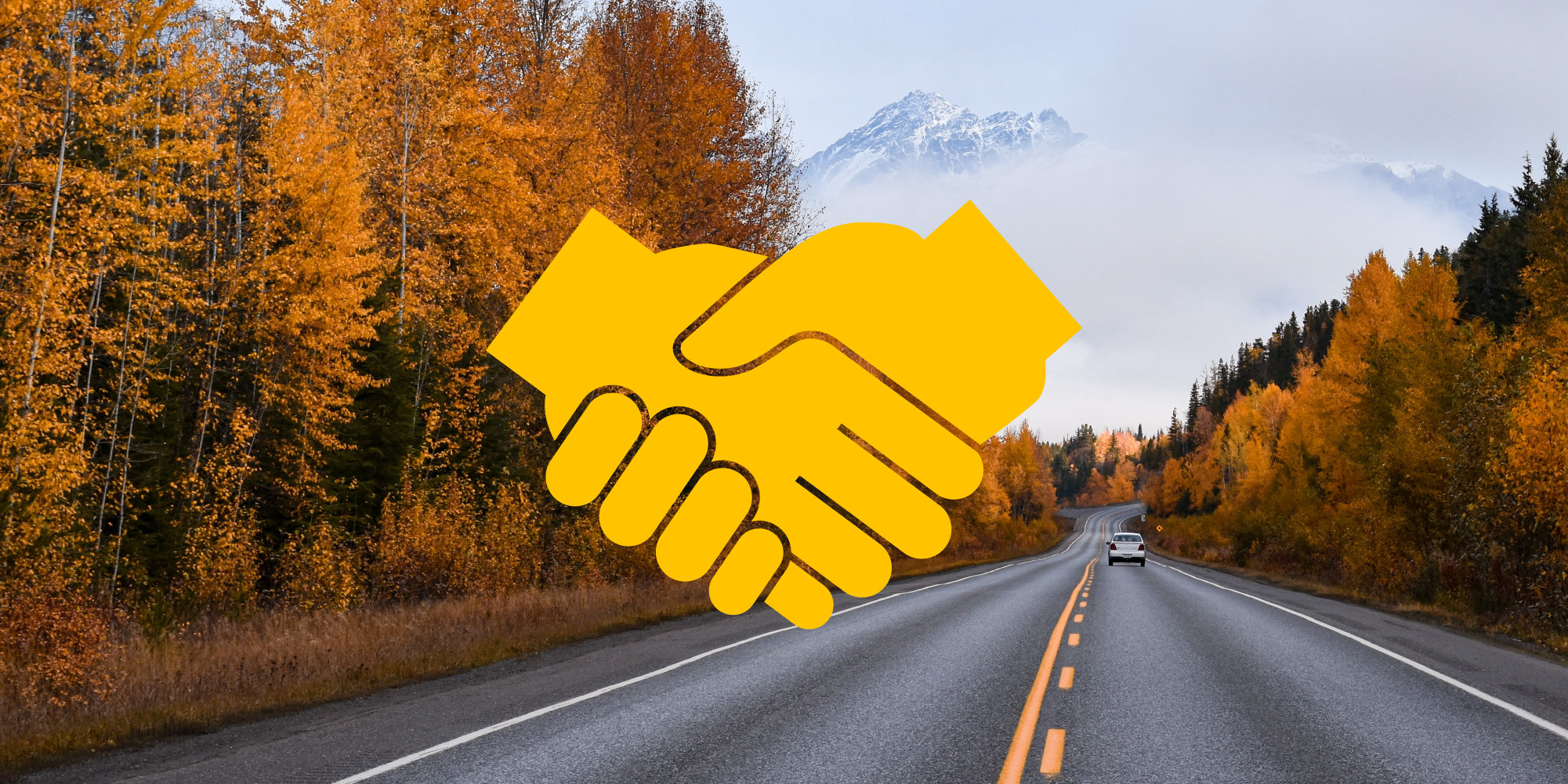
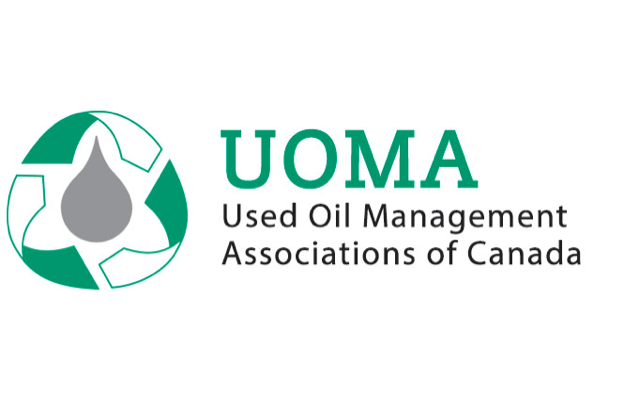
Provincial Programs (UOMAs)
BCUOMA works closely in partnership with eight other provincial programs through the national working group, the National Used Oil Material and Antifreeze Advisory Council (NUOMAAC) which coordinates the Canada-wide used oil and antifreeze materials recycling effort and encourages national standards. The UOMA industry-led stewardship program model works in close collaboration to achieve environmental, economic and socio-economic successes across Canada.
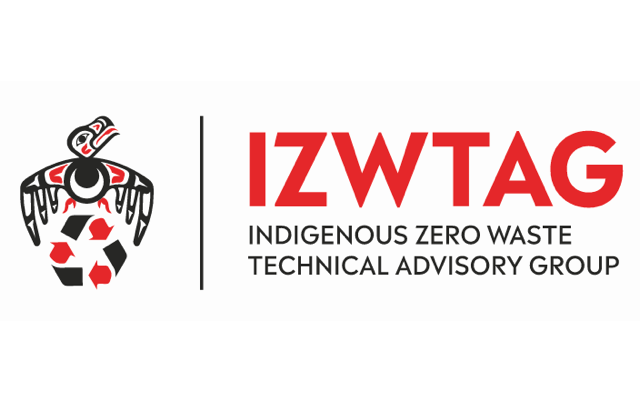
Indigenous Zero Waste Technical Advisory Group (IZWTAG)
BCUOMA is proud to have been the first Associate Member of the Indigenous Zero Waste Technical Advisory Group (IZWTAG), a non-profit society dedicated to supporting zero waste systems in all First Nation communities in BC. In 2021, BCUOMA worked with IZWTAG to ensure used oil and other BCUOMA program products were safely managed in First Nation communities and responsibly recycled.
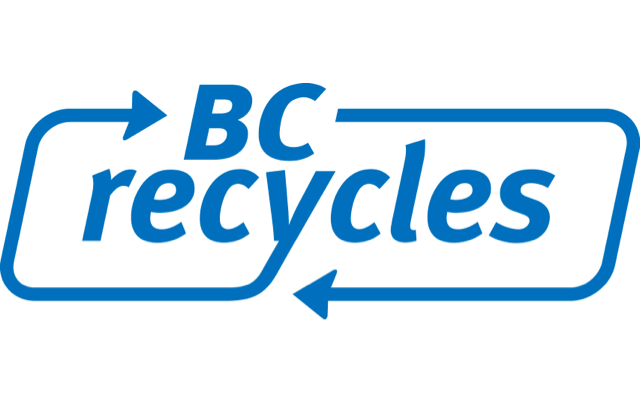
BC Stewardships (SABC)
BCUOMA is an active member of the Stewardship Agencies of British Columbia (SABC), an informal alliance of industry product stewardship organizations. SABC works with government, service providers and other stakeholders to ensure B.C.’s extended producer responsibility model is successful and cost effective.
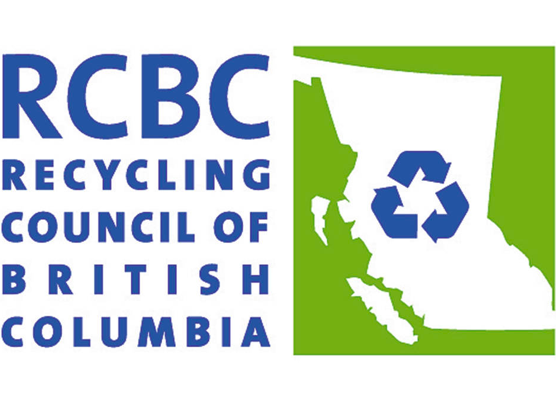
Recycling Council of BC
As part of our commitment to always ensuring access to key program information, BCUOMA participates with other stewardship programs to fund the Recycling Council of BC’s hotline and Recyclopedia database. Consumers looking to have their recycling questions answered can call the hotline at 1-800-667-4321 or download the Recyclepedia app.
Collection Network Performance
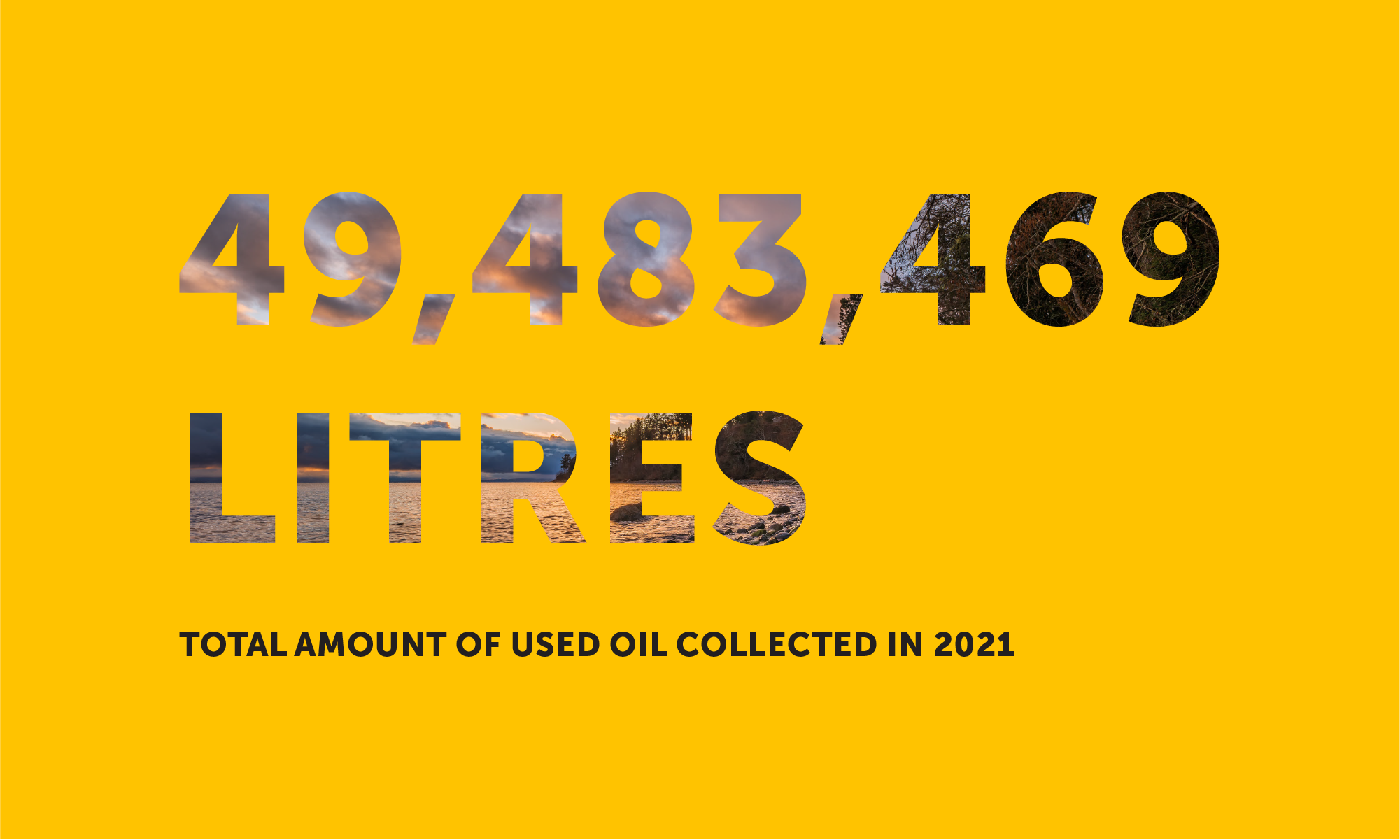
BC Used Oil Management Association is a mature product stewardship program with material collection spread across a large network of generators across nine designated zones in BC. Many of these generators change oil, filters, and antifreeze commercially and then call collectors in the BCUOMA program for pick-up. Any approved end use must be environmentally sound and in compliance with environmental requirements.
Of all the used oil and antifreeze collected in BC, 94% is collected from commercial facilities such as service stations, lube shops and large commercial operations (e.g., mining, forestry and agriculture). These commercial facilities are typically serviced by a registered BCUOMA collector that has a service agreement with that facility.
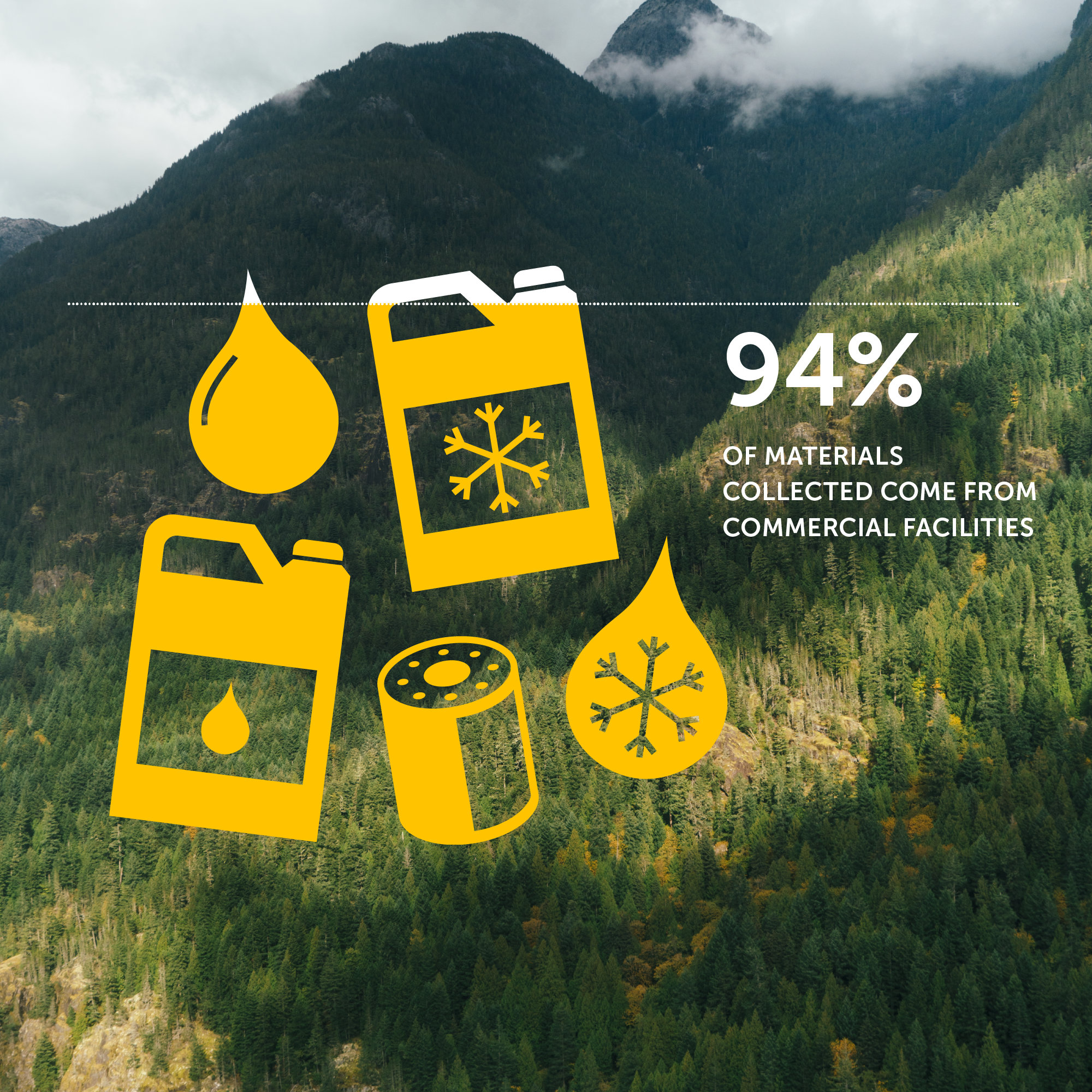
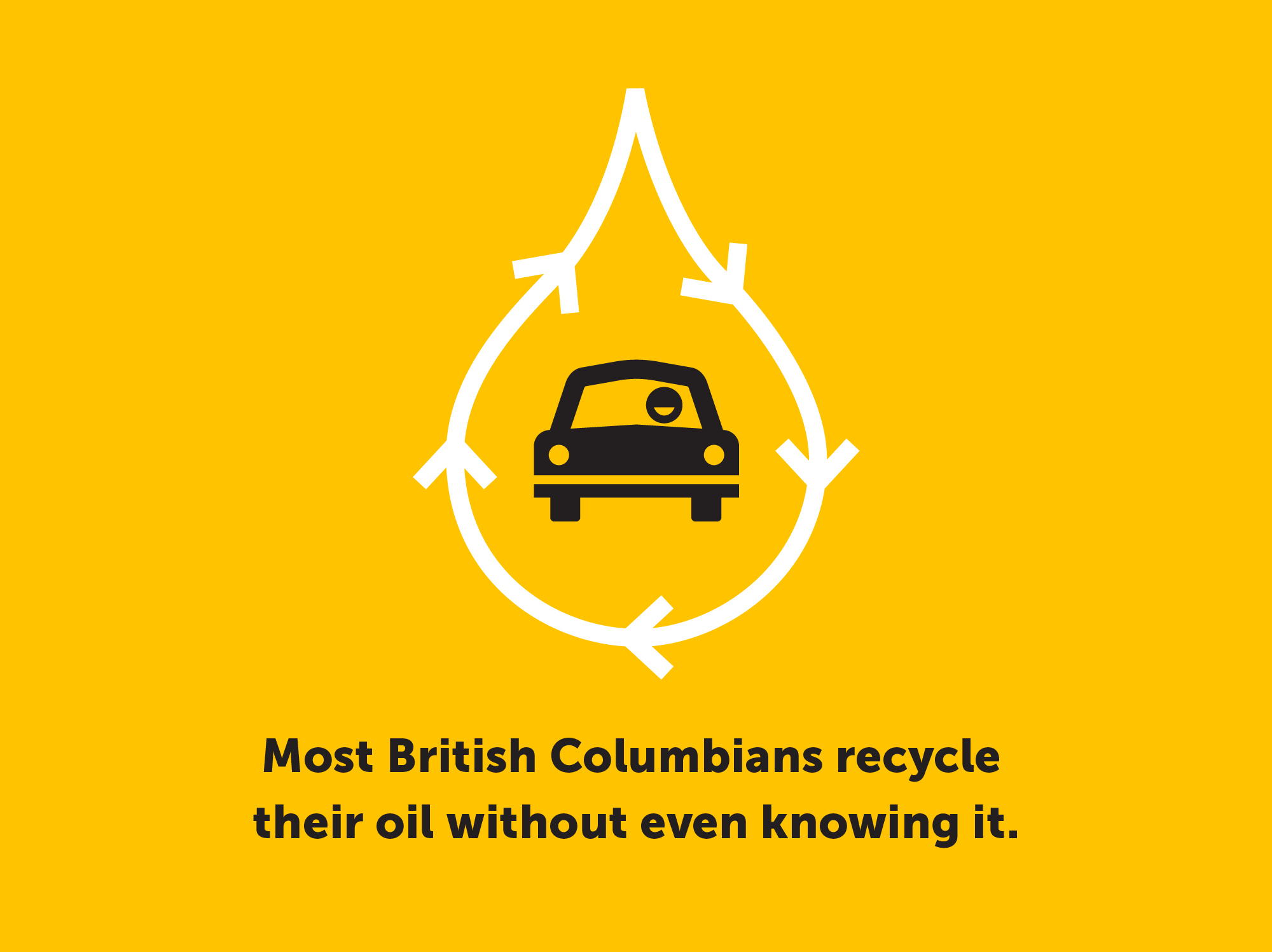
If you get your oil changed at a lube shop or by a mechanic, you are already doing your part to make sure your used oil stays out of the ecosystem. Only a small amount—approximately 6% of the total used oil and antifreeze collected in BC—comes from consumers that change their own oil/antifreeze or small commercial operators that choose to use the free consumer drop-off system.
For consumers that choose to change their own oil or antifreeze, BCUOMA has a province-wide network of registered public recycling centres that provide consumers with free access for recycling of program materials.
In 2021, there were 286 publicly accessible recycling centres located in high traffic retail locations, industrial sites, multi-material private depots (bottle depots) and local government recycling/landfill sites. Each year we look to identify areas of the province that need new facilities and work to find a partner in that area to support. Through the awarding of infrastructure grants, BCUOMA ensures each facility has the right equipment to manage program materials. In 2021, a total of 26 grants were awarded.
| Year | Number of Facilities |
|---|---|
| 2021 | 286 |
| 2020 | 273 |
| 2019 | 274 |
| 2018 | 291 |
98.9% of British Columbians currently have reasonable access to recycling location. BCUOMA continues to work with recycling centre operators to ensure all public facilities are safe and secure by providing grants for new infrastructure such as modified sea containers with spill containment, collection tanks and consumer friendly signs.
Given the low product volumes represented by consumer collection, accessibility to recycling is considered a more meaningful BCUOMA performance measure for this stream than the level of product recovery.
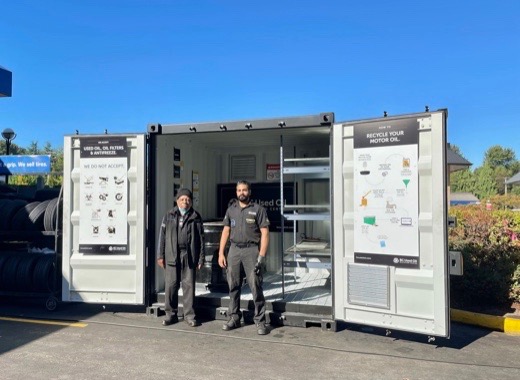
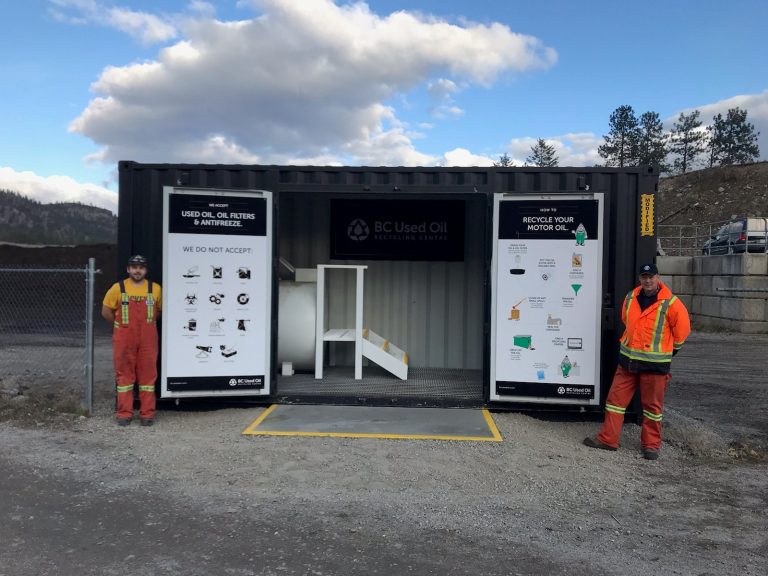
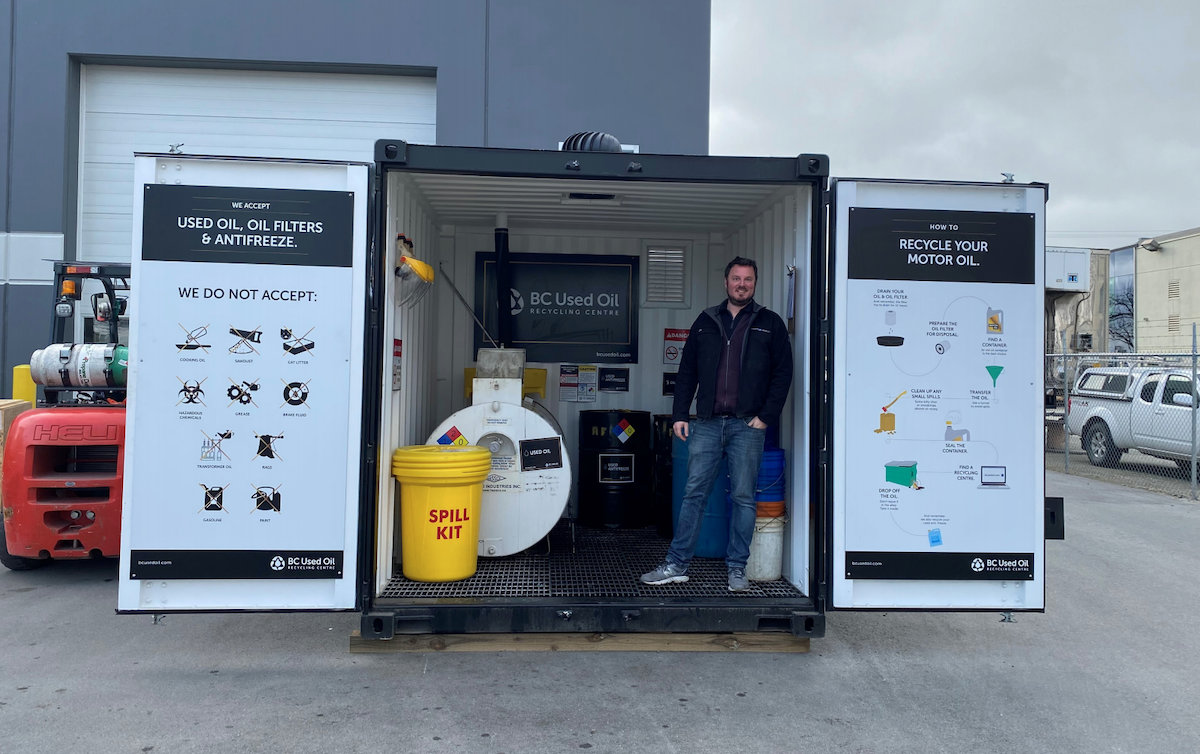
Accessibility
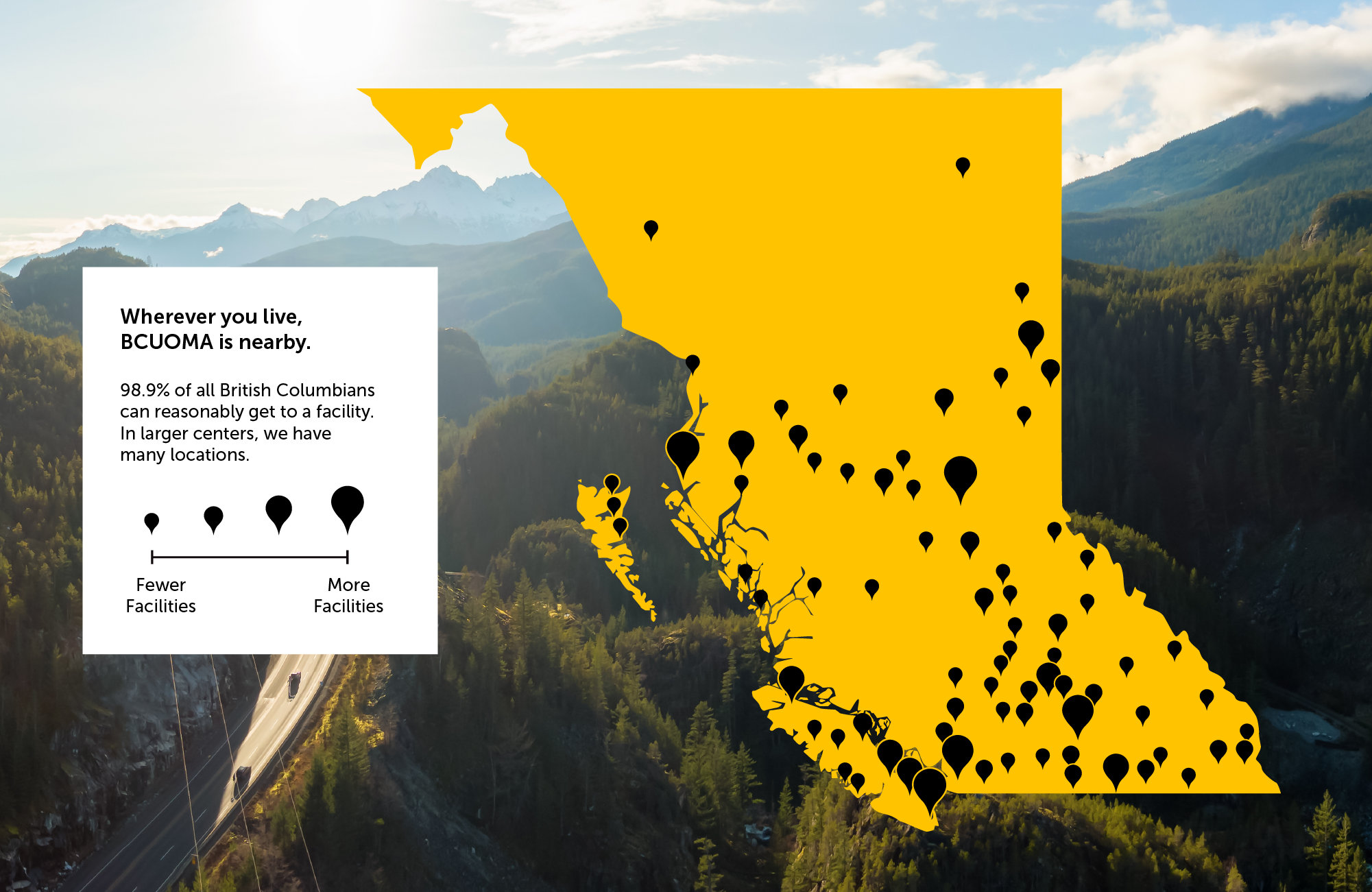
Ensuring that all British Columbians have reasonable access to a registered facility is a key goal for our organization. Recognizing that reasonable access looks different across the more remote areas of the province, we made a change to our reporting in 2020 by distinguishing Regional District Electoral Areas (the unincorporated areas outside of municipal boundaries) from the adjacent communities and measuring their access to BCUOMA facilities separately.
Applying that same methodology to 2021, we can report that 98.9% of British Columbians have access to BCUOMA registered facilities. This is an increase from the 94% we reported last year.
We are always looking at ways to improve access in remote locations and will continue to work closely with our network of collection facilities to help manage the materials in a safe and efficient manner. As outlined in our Stewardship Plan, BCUOMA’s service level reporting is based on the following community types:
| Type of Community | Enhanced Service Level |
|---|---|
| City, High Industrial | One facility per 100,000 people |
| City, High Industrial | One facility per 200,000 people or one facility within a 30-minute drive if the population is less than 200,000 |
| Town, High Industrial | One facility |
| Town, High Industrial | One facility within a 30-minute drive, otherwise its own facility |
| Village | One facility within a 30-minute drive, otherwise its own facility |
BCUOMA has defined the community types as follows:
| Type of Community | Population Characteristics | Business Establishment Characteristics | Number of Communities | Population (2016) |
|---|---|---|---|---|
| City, High Industrial | More than 5,000 | More than 20per 10,000 people | 44 | 1,449,800 |
| City, Low Industrial | More than 5,000 | 20 or less per 10,000 people | 53 | 2,690,333 |
| Town, High Industrial | 2,501 to 5,000 | More than 50 in total | 3 | 14,196 |
| Town, Low Industrial | 2,501 to 5,000 | 50 in total or less | 63 | 228,627 |
| Village, High Industrial | 1,000 to 2,500 | More than 50 in total | 1 | 1,047 |
| Village, Low Industrial | 1,000 to 2,500 | 50 in total or less | 89 | 149,683 |
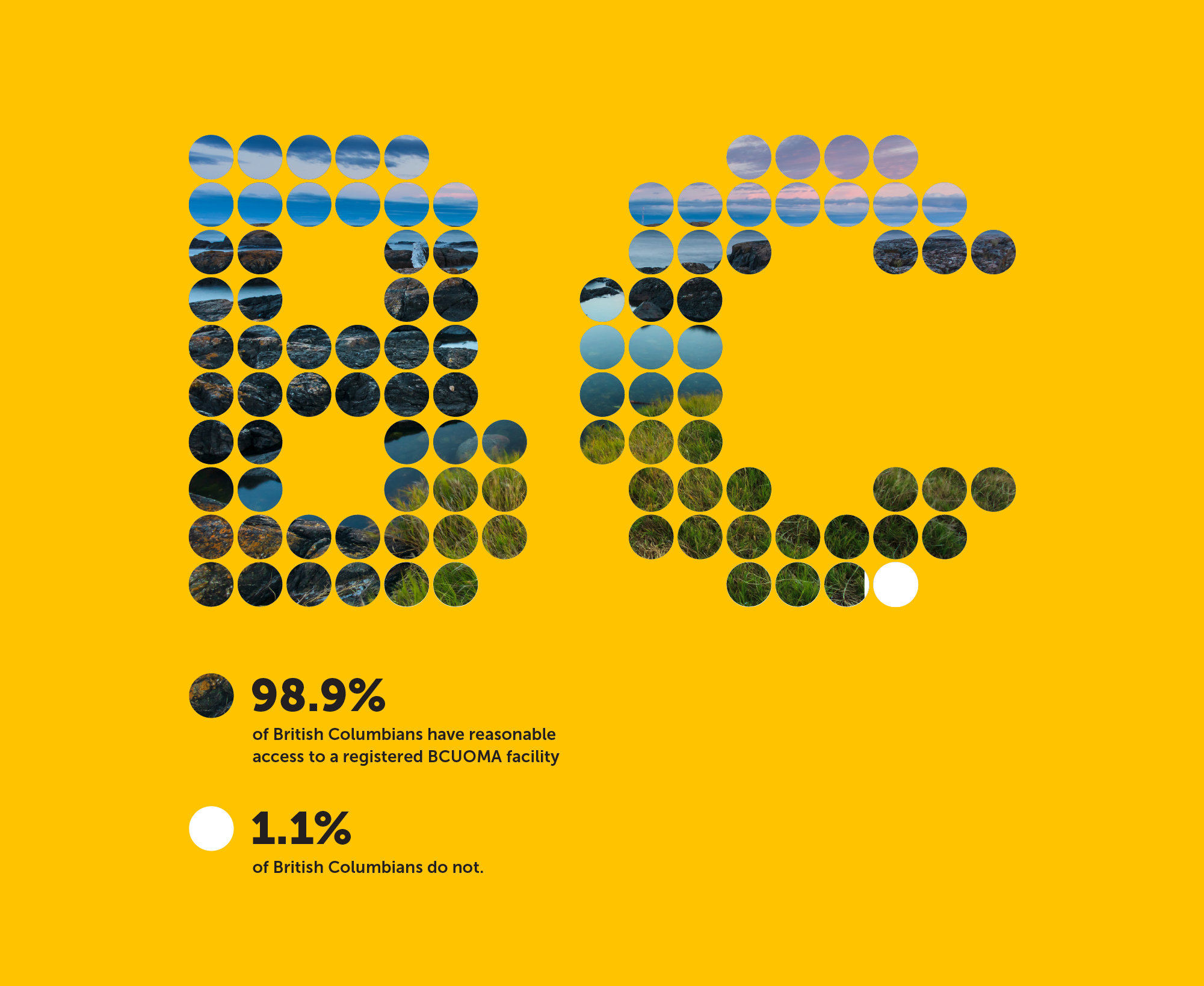
Capture Rates in 2021
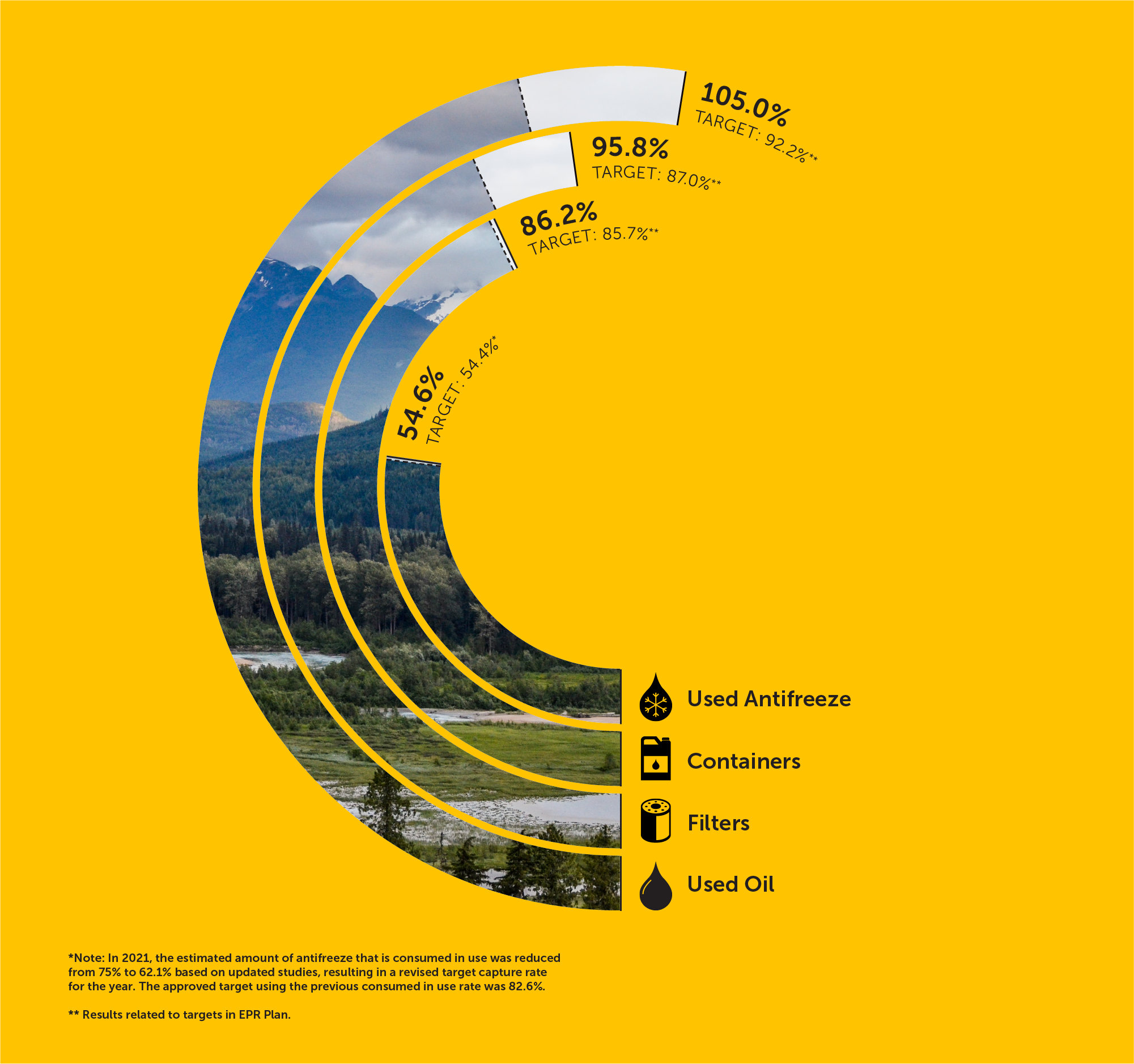
Product Collection
As BCUOMA is a mature program, our product collection numbers have always been stable, consistent and much higher than the 75% identified in the Recycling Regulation.
Absolute collection for used oil, antifreeze, oil filters and oil and antifreeze containers increased in 2021 for all products. Product sales in 2021 decreased for oil by 0.6% while increasing by 7.8% for oil filters, 4.4% for antifreeze, and 4.0% for oil and antifreeze containers.
Used Oil (millions of litres) | Filters (millions of units) | Containers (millions of kilograms) | Used Antifreeze (millions of litres) | |
|---|---|---|---|---|
| Sold (2021) | 91.1 | 6.8 | 2.0 | 12.7 |
| Consumed in use | 26.7 | n/a | n/a | 7.9 |
| Repurposed | 17.3 | n/a | n/a | n/a |
| Available for collection | 47.1 | 6.8 | 2.0 | 4.8 |
| Collected | 49.5 | 6.5 | 1.7 | 2.6 |
| Capture rate* | 105% | 96% | 86% | 55% |
Only a portion of every litre of oil and antifreeze sold is available for recovery because an estimated 29.3% of the oil and 62.1% of the antifreeze is consumed during use and an estimated 26% of oil not consumed in use is re-purposed each year and is not available for collection.
*Capture Rate % may not appear accurate due to rounding
End Fate for Products Collected
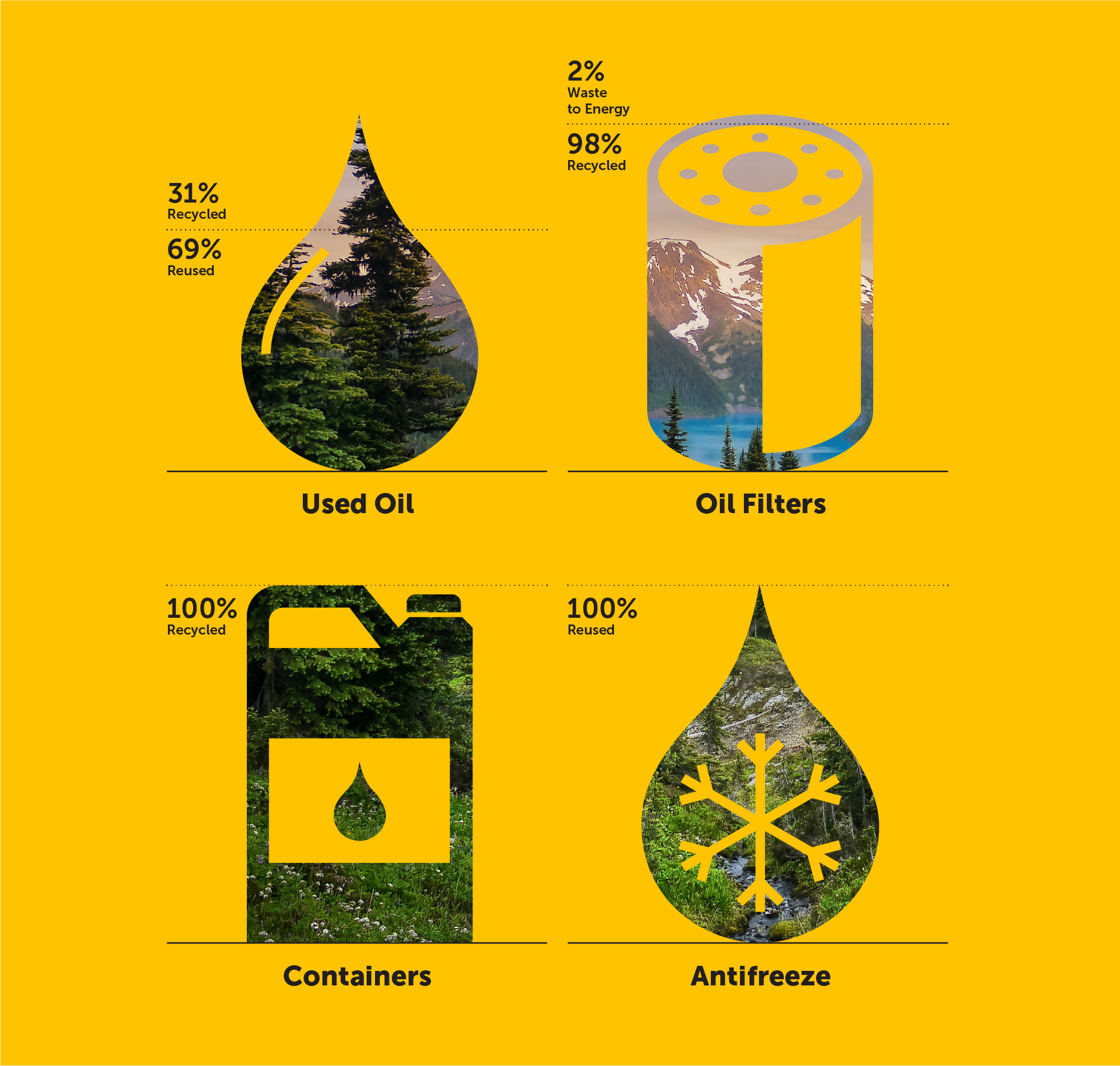
Product Management
Collected products are managed in accordance with the Pollution Prevention Hierarchy as outlined in the BC Recycling Regulation.

Used Oil
Oil previously sold as lubricating oil is collected, refined and reused as lubricating oil. Some oil is collected, transformed and recycled as a new energy product. This includes re-refining and use as a fuel for pulp mills, cement kilns, asphalt plants and other uses that meet the Hazardous Waste Regulation or applicable government standards in other states or provinces, such as for mining explosives or exploration drilling.

Used Antifreeze
Antifreeze previously sold as an antifreeze product is refined and reused as an antifreeze product. Antifreeze processors are already actively involved in processing used antifreeze to the point where an additive package can be included, and the recycled antifreeze can again be sold for automotive use.

Used Oil Filters
Metal filters are collected and recycled into other metal products. Paper filters that cannot feasibly be recycled are managed so the inherent energy can be recovered.

Used Oil & Antifreeze Containers
Plastic and metal containers are recycled into new plastic and metal products. BCUOMA are proud of the fact that both used antifreeze and empty containers are processed and recycled at facilities right here in British Columbia. Managing these products locally provides significant environmental, economic and social benefits that support our transition to a more sustainable and Circular Economy.

